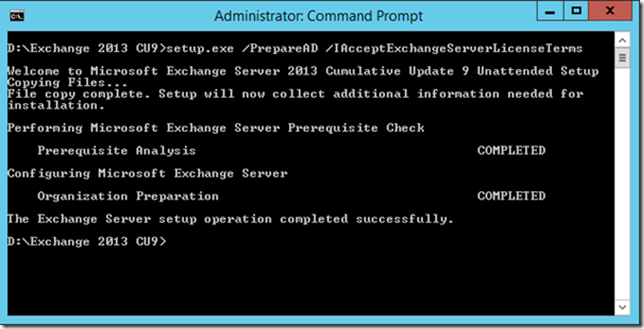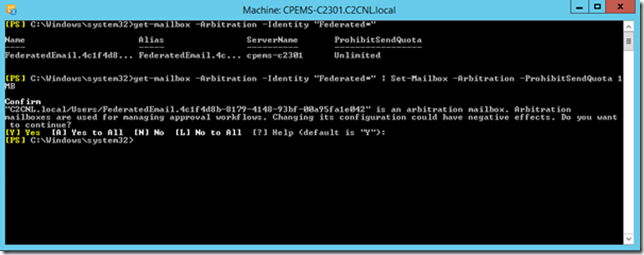Get-Mailbox –Arbitration command to see current location of Arbitration mailboxes.
To recreate the Arbitration Mailboxes we first have to remove everything the accompanying user accounts, which can be found in CN=Users in Active Directory:
When the user accounts are deleted you can run the Get-Mailbox –Arbitration command again to see if they are really removed.
Setup.exe /PrepareAD /IAcceptExchangeServerLicenseTerms command again (from the correct installation media by the way) to recreate the Arbitration Mailboxes:
The user accounts are now created again, and the next step is to Mail-Enable them:
1
2
3
4
| Enable-Mailbox –Arbitration –Identity "FederatedEmail.4c1f4d8b-8179-4148-93bf-00a95fa1e042"Enable-Mailbox –Arbitration –Identity "SystemMailbox{1f05a927-8668-4003-adad-9b80758e86db}"Enable-Mailbox –Arbitration –Identity "SystemMailbox{e0dc1c29-89c3-4034-b678-e6c29d823ed9}"Enable-Mailbox –Arbitration –Identity "SystemMailbox{bb558c35-97f1-4cb9-8ff7-d53741dc928c}" |
To prevent typos you can also use the following command:
1
2
| Get-User | Where {$_.Name –like "SystemMailbox*"} | Enable-Mailbox -ArbitrationGet-User | Where {$_.Name –like "FederatedEmail*"} | Enable-Mailbox –Arbitration |
The DisplayName of the Arbitration Mailbox SystemMailbox{e0dc1c29-89c3-4034-b678-e6c29d823ed9} needs to be changed to “Microsoft Exchange”. This can be achieved using the following command:
1
| Get-Mailbox –Identity "SystemMailbox{e0dc1c29*" –Arbitration | Set-Mailbox –Arbitration –DisplayName "Microsoft Exchange" |
The federation Arbitration Mailbox needs to have a 1MB quota limit set to it, this can be achieved using the following command:
1
| Get-Mailbox –Arbitration –Identity "FederatedEmail*"} | Set-Mailbox –Arbitration –ProhibitSendQuota 1MB |
The Arbitration Mailboxes are up and running again, you can check using the Get-Mailbox –Arbitration command:
source:
http://jaapwesselius.com/2015/10/14/exchange-2013-recreate-arbitration-mailboxes/






Very Useful Article ... EdbMails Exchange Migration tool migrates mailboxes from Exchange server to Exchange server. Also Exchange migration to office 365 . The software migrates individual as well as multiple mailboxes. It displays mailbox folder items count in preview. The tool has intuitive interface. That makes the user to perform the migration process very easily. Migration includes E -mails, calendars, Contacts , Journals, Tasks, etc.
ReplyDeleteMain Features of Exchange Server Migration:
Migrate Exchange 2007/2010 to Exchange 2007,2010,2013,2016
Migrate Exchange 2013 to Exchange 2007,2010,2013,2016
Migrate Exchange 2016 to Exchange 2007,2010,2013,2016
Best Exchange Server Migration Tool: Migrate exchange server to exchange server without any data loss. It maintains data integrity and there is no limitation of mailboxes
True incremental migration: The migration is true incremental without duplicates
Exclude folder option : Exclude folder option can be used during migration.
Migrating Exchange Server to Exchange Server / Office 365: EdbMails provides feature to Migrate Exchange server to Exchange Server or Office 365 directly.
Demo version: You can Download and install the trial version, it’s completely free and you can recover upto 30 items from each and every mailbox folders.
To the point user interface with modern elements.
For more information visit: Exchange migration to office 365 | Upgrade Exchange 2010 to 2016 | Exchange 2010 to 2016 migration | Exchange 2010 to office 365 migration | Exchange Migration